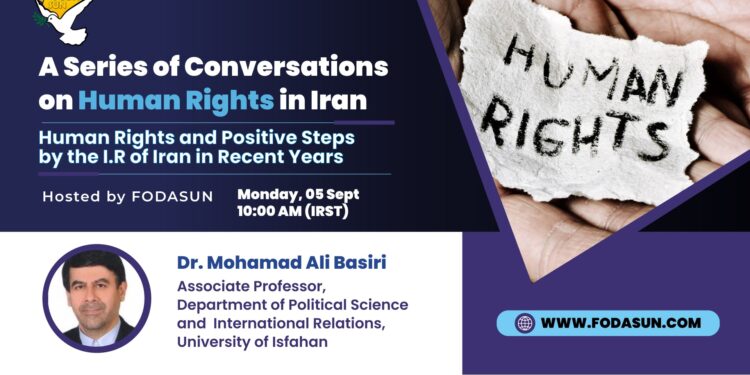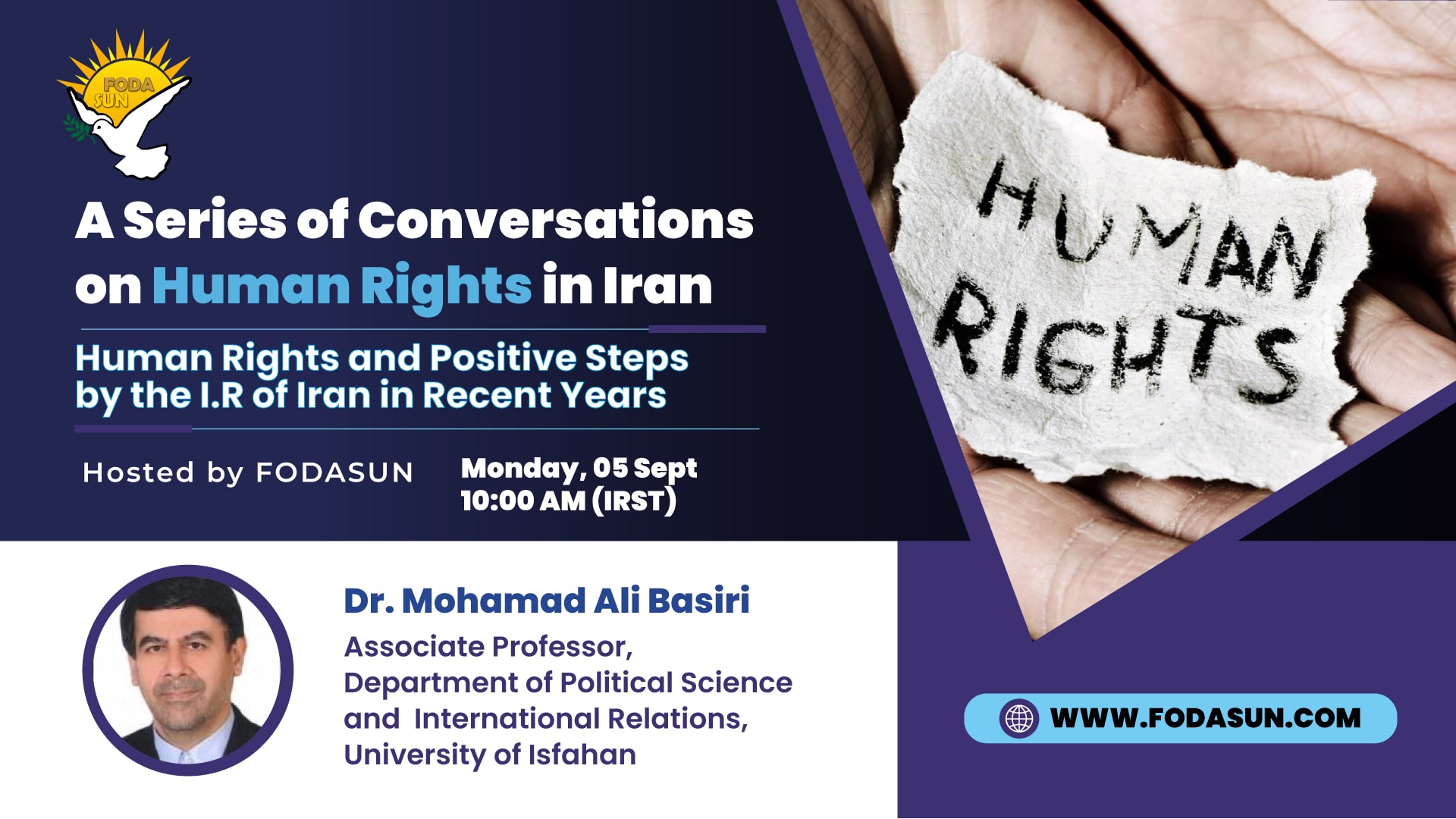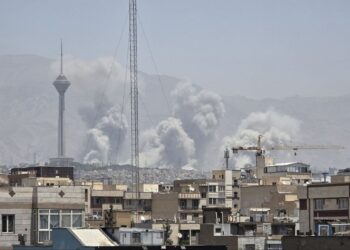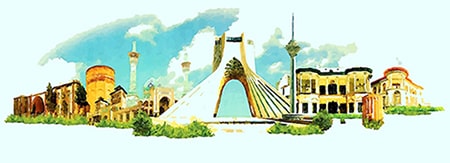
As the second program on a series of conversations about the Human Rights situation in Iran, FODASUN hosted Dr. Mohammad Ali Basiri from Isfahan University addressing the development of this topic in the country.
This is the text of the speech:
The Islamic Republic established its human rights laws based on true Islamic thinking, which is the most complete basis for protecting human rights and bringing people to perfection. A significant part of the Constitution of the Islamic Republic deals with the issue of human rights and citizens’ rights, including the right to vote, the right to education, the right to health, the right to employment, the right to freedom of religion, the right to freedom of speech and assembly, the right to sue, etc.
Considering this issue and the correct implementation of these rights, democracy which is the most important sign and example of human rights and without which human rights have no meaning, has taken root in all aspects of people’s lives since the beginning of the revolution. Choosing the type of ruling government, choosing the members of the parliament, drafting the constitution by direct vote of the people, entrusting the adoption of all fateful decisions to the people through voting, granting the same and equal voting rights to all sections of the society, choosing all the officials of the country by direct and indirect vote of the people. Holding 40 elections in the 43-year life of the revolution, which is unique in its kind in the world, all indicate the institutionalization of religious democracy in the Islamic Republic system. The existence of these features has made the Islamic Republic to become the largest democratic government in the region.
The third chapter of the constitution, entitled “Rights of the Nation”, contains 24 principles and deals with the expression of human rights and fundamental freedoms of individuals and other rights such as the right to education, the right to health, the right to housing, the right to life, the right to employment, etc. Also, in other chapters and principles, there are explicit references in this field, principles such as the inherent dignity of human beings, the enjoyment of fair judicial security and the equality of all before the law, the enjoyment of fair judicial security and the equality of all before the law, the enjoyment of civil rights, political and social freedoms of individuals, all of which are recognized in the constitution.
A- Practical positive steps in the improvement of human rights in the Islamic Republic of Iran
In addition to the above documents in support of human rights and its practical measures in the last four decades, the following positive measures have been taken in recent years to improve human rights in Iran.
It is necessary to explain in all countries due to unfavorable economic-financial conditions caused by the world economic crisis. The Corona crisis and the recent war between Russia and Ukraine have reduced the level of human rights protection, and Iran was no exception. In addition to the mentioned unfavorable conditions, Iran has also been subject to sanctions and economic war, but despite these imposed unfavorable conditions, it has taken the following positive steps in the field of human rights.
1- Vaccinating the majority of Iranians and reducing the death rate of 700 people per day to about 5 people.
2- Economic adjustment and the expansion of economic-social justice and the promotion of financial aid, a subsidy to three floors of vulnerable groups from about 45 thousand tomans to 300 thousand tomans.
3- A large volume of government and people’s financial assistance to areas and people affected by floods, earthquakes, droughts, etc. in recent years due to the crisis-prone nature of Iran.
4- Extensive exemptions and remissions in water, electricity and gas costs for the poor and low-income groups throughout the country.
5- Compilation of more humane alternative punishment laws for prisoners, criminals and convicts of murder, robbery, dowry, etc.
6- Easing the general conditions and possibilities of prisoners in pardoning, reducing the punishments, reducing the sentence period, increasing the leave. During the sentence with his family etc.
7- In spite of the sanction and reduction of the government’s budget, the establishment of free meals in the country’s schools from new scholar year 2022 after the Corona period.
8- Freedom of expression
They work in line with Iran’s freedom of expression by having hundreds of newspapers, magazines and 150 foreign media offices. Also, according to the international evaluations of the “State of the World Internet”, the Islamic Republic has the highest number of Internet users in the Middle East region, and people have access in many Sites and social networks.
9- Prison and prisoners
According to Article 39 of the Constitution, defaming someone who has been arrested or imprisoned according to the law is prohibited and punishable. Clause 65 of the general policies of the 6th Development Plan has also put improving the condition of prisons on its agenda. While continuously monitoring the prisons and the way the employees deal with the prisoners, the Prisons Organization of the country constantly organizes training courses for its employees on how to deal with the prisoners. In addition, in many prisons, cultural, sports and educational environments have been created so that prisoners have access to their other rights and do not lag behind the society. In this regard, we can mention the existence of universities, swimming pools, technical and training classes, etc. in prisons.
10- Status of women
The status of women and their rights, as well as their position in society, are not comparable since the revolution compared to before. In addition to the high position of women in Islam and consequently in the constitution, special attention and support have been given to them in various legislative and policy-making parts of the country. In recent years, the share of women in private sector jobs has increased from 14.6% in 1996 to 72.8% in 2011. The share of women in seats in the Islamic Council has increased by 450% during the first to the ninth period of parliamentary elections.
11- The status of minorities
In the Islamic Republic of Iran, with a population about 83 million people, 200,000 recognized religious minorities, namely Christians, Zoroastrians, and Jews, equal to two-tenths of the total population of the country, live, which, like other citizens, are a source of pride for the country.
12- On the other hand, in the last 40 years, the Islamic Republic of Iran has incurred enormous human and material costs in the fight against narcotics. Neighbors of Iran is the largest producer and exporter of narcotics in the world, and in addition to protecting its citizens, it has always tried to prevent the transit of these substances from its territory to third countries, and in this way, it has used all its material and human resources. So far, thousands of Iranian border forces have been martyred in the fight against drugs. During this time, it has been tried to limit the death sentence for the leaders of the drug trade.
13- Fighting terrorism
In addition to the legal and executive measures in the field of promoting human rights inside the country, the Islamic Republic, considering the spread of the sinister phenomenon of terrorism and extremism in the region recently in the face of Takfiri and Salafi groups such as Daesh, Nusra, Ahrar al-Sham, He has dealt seriously with terrorism and is doing all his efforts in the international arena to create a united front to really deal with terrorism.
B- The positive steps of this period in legal reforms to improve human rights in I.R. of Iran
1- Islamic Penal Code
New laws are always drafted and approved to improve and enhance the rights of citizens, or existing laws are modified according to the requirements and developments of the society. One of these cases is the Islamic Penal Code, which was revised in 2002. With the benefit of the opinions and suggestions of lawyers, this law has been improved in terms of substance and content and has been presented more comprehensively. Some of the reforms and innovations made in this law to promote and protect human rights are: Prohibition of retrial and the validity of the sealed order regarding decisions issued by foreign courts; Non-retrospective criminal laws and retroactive laws favorable to the accused; decriminalization and de-imprisonment; Calculating the days of detention before issuing a final verdict; The approach of restorative justice such as electronic imprisonment (imprisonment of the convict in a specific place under the supervision of electronic systems); Application of the rule of law in all crimes (when the occurrence of a crime or some of its conditions or any of the conditions of criminal liability is suspected or doubted and no evidence is found to negate it, it is not proven according to the crime or the said condition); The fall of the punishment in some crimes causes a limit in case of remorse and repentance; emphasizing the principle of legality of crimes and punishments; The need to pay attention to effective factors such as the records and personal and family status of the perpetrator, his motivation, his psychological state during the commission of the crime, etc. in issuing a punishment sentence; Provision of institutions under the title of postponement of sentencing and suspension of execution of punishment; semi-liberal system, parole system and alternative punishments; and paying special attention to the proceedings of people under 18 years of age (non-criminal liability for minors, elimination of prison for people between 15 and 18 years of age in criminal offenses and referral to correctional centers or fines depending on the type of crime, the necessity of verifying the understanding of sanctity or The nature of the crime and intellectual development in the crimes that cause the crime or retribution).
2-Criminal Procedure Law
The amendment of the Criminal Procedure Law and its implementation from July 1, 2015 is another positive and constructive development in the direction of promoting and protecting human rights in the Islamic Republic. Some of the new innovations of this law are as follows: systematizing the principles governing the proceedings and predicting the principles of fair proceedings, forming special police for children and adolescents, interrogating women and minors by female officers, contacting the accused with their families. After being monitored, the need for a lawyer to be present in the phase of monitoring and preliminary investigation, compensation for the days of detention after acquittal, removal of the mandatory temporary detention order, conversion of the guilty order to a summons order, the necessity of filing a character file regarding serious crimes, attention to the organization non-governmental organizations as crime informers, and summoning and arresting only by the order of the judicial authorities.
3-Other laws and mechanisms in the field of human rights and citizenship
Among other laws and measures for the promotion of human rights in the Islamic Republic, are: Family Protection Law (2011), Law for the Protection of Unsupervised and Abused Children and Adolescents (2012), Crime Prevention Law (2014), pre-compilation Author of the National Document on the Security of Women and Children in Social Relations, Drafting of the National Document of Children’s Rights (2014), Drafting of the Charter of Citizen Rights by the Presidency, Drafting of the Charter of Citizen Rights in Housing, Rights and Charter of Rights and Duties of the Traffic Police .
In addition to the above laws, in the Islamic Republic of Iran, in order to protect and promote human rights as much as possible, which include monitoring and support mechanisms have been established in various sectors,
4- Compilation of the document on the transformation of the field of women and family, destiny
Citizenship of children of Iranian mothers with foreign fathers, welfare call for adoption of children with diseases and disabilities, filing of 10,000 infertile couples in social security, identification of working children and support packages for women and street infected with HIV
5- The position of women and family affairs in the country’s future twenty-year vision document
Strengthening the position of women in the institution of the family and in social scenes has existed in every era. Article 111 of the Law of the Fourth Plan of Economic, Social and Cultural Development of the Islamic Republic of Iran can be changed every 5 years, according to which the government is obliged, with the aim of strengthening the role of women in society and expanding their participation in the country, to develop a comprehensive program for the development of women’s participation, including the revision of laws and approve and implement the regulations, especially the civil law.
6- The position of women’s human rights in the family protection law
In the constitution, women and family are considered in several principles and the government is obliged to determine the rights of women in all aspects by observing Islamic standards. Also, the Family Law approved in 1991, the Law on Ensuring the Rights of Women and Unsupervised Children approved in 1992 and 1993, the possibility of divorce on the part of a woman with a condition in the contract according to Article 1119 of the Civil Code, the prohibition of hard and harmful work for women according to Article 75 of the approved Labor Law 1990, the prohibition of night work for women and the prohibition of work for pregnant women from six weeks before childbirth to four weeks after, according to the aforementioned law, are among the relevant laws that have paid attention to women’s rights.
Based on this, the Supreme Administrative Council of the Ministry of Interior in August 2016 applied and approved the approach of optimal and optimal use of the services of young people and women in managerial positions, policies and operational measures necessary to increase the ratio of female managers until the end of the sixth development plan.
Examining the current situation of management positions in the headquarters of the Ministry of Interior shows that currently 23% of the management positions of the headquarters are assigned to women and 40% to young people aged 30-45.
According to the statistics of the Ministry of Interior, in 2019, 339 of all the managers of the Ministry of Interior and governorates were women, while this number increased to 633 in 2018 with a growth of 87%.
Conclusion
The brief conclusion is that despite the external problems imposed on Iran and the internal obstacles in the last two decades, the positive steps to improve human rights in Iran in the field of practice and legislation are considered useful and defensible.





